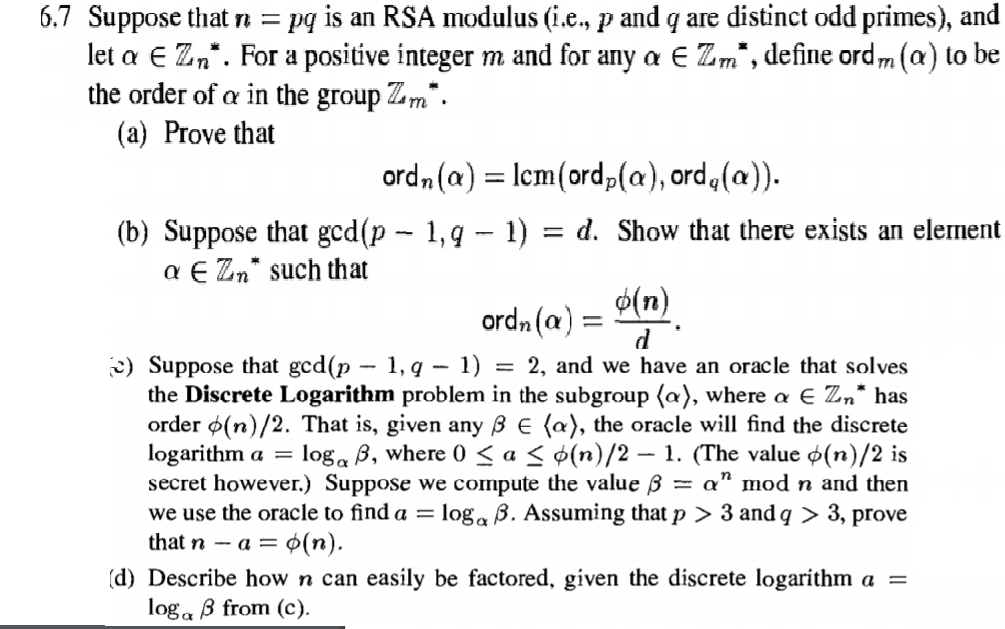
Suppose that n = pq is an RSA modulus (i e, p and q are distinct odd primes), and let alpha epsilon Z_n*. For a positive int eger m and for any alpha epsilon Z_m*, define ord_m (alpha) to be the order of alpha in the group Z_m*. (a) Prove that ord_n (alpha) = lcm (ord_p (alpha), ord_q (alpha)). (b) Suppose that gcd(p - 1, q - 1) = d. Show that there exists an element alpha epsilon Z_n* such that ord_n (alpha) = phi (n)/d. c) Suppose that gcd(p - 1, q - 1) = 2, and we have an oracle that solves the Discrete Logarithm problem in the subgroup (alpha), where alpha epsilon Z_n* has order phi (n)/2. That is, given any beta epsilon (alpha), the oracle will find the discrete logarithm alpha = log_alpha beta, where 0 lessthanorequalto a lessthanorequalto phi (n)/2 - 1.(The value phi(n)/2 is secret however.) Suppose we compute the value beta = alpha^n mod n and then we use the oracle to find alpha = log_alpha beta. Assuming that p > 3 and q > 3, prove that n - a = phi (n). (d) Describe how n can easily be factored, given the discrete logarithm a = log_alpha beta from (c). Suppose that n = pq is an RSA modulus (i e, p and q are distinct odd primes), and let alpha epsilon Z_n*. For a positive int eger m and for any alpha epsilon Z_m*, define ord_m (alpha) to be the order of alpha in the group Z_m*. (a) Prove that ord_n (alpha) = lcm (ord_p (alpha), ord_q (alpha)). (b) Suppose that gcd(p - 1, q - 1) = d. Show that there exists an element alpha epsilon Z_n* such that ord_n (alpha) = phi (n)/d. c) Suppose that gcd(p - 1, q - 1) = 2, and we have an oracle that solves the Discrete Logarithm problem in the subgroup (alpha), where alpha epsilon Z_n* has order phi (n)/2. That is, given any beta epsilon (alpha), the oracle will find the discrete logarithm alpha = log_alpha beta, where 0 lessthanorequalto a lessthanorequalto phi (n)/2 - 1.(The value phi(n)/2 is secret however.) Suppose we compute the value beta = alpha^n mod n and then we use the oracle to find alpha = log_alpha beta. Assuming that p > 3 and q > 3, prove that n - a = phi (n). (d) Describe how n can easily be factored, given the discrete logarithm a = log_alpha beta from (c)







